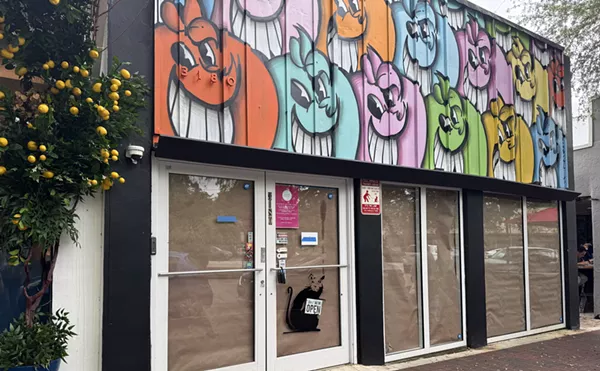Yet it's these undergrads -- and their love for tales of the louche life -- who have turned Ellis into a wealthy cult figure, one who has sold more than 1.5 million books. In fact his 1991 novel American Psycho, with its graphic depictions of a Wall Street lothario cum serial killer, continues to sell nearly 2000 copies each month, according to Publishers Weekly. True, those are hardly John Grisham-size numbers. But they still eclipse the tallies of many of Ellis's more "serious" contemporaries, authors who have eschewed a fascination with celebrities and designer gear for a Cheeveresque concentration on inner drama -- writing tomes, he jokes, that might as well be called The Millipede's Lament.
Ellis's current admirers seemed unaware of that sizable chip on his shoulder. For them his status as the critical whipping boy of the Eighties Brat Pack was forged before they were even born: Released when the Los Angelino was only 21, Ellis's notorious debut, Less than Zero, first arrived in stores back in 1985. As for New York Times book critic Michiko Kakutani's complaint that the bulk of Ellis's work portrays a Los Angeles "in which drugs, aerobics, sex, and narcissistic navel-gazing seem to be the only activities in town," that may have been an indictment two decades ago. Today it sounds like a chunk of knowing social reportage. Indeed, substitute yoga for aerobics and (if it doesn't already fall under that category of navel-gazing) add in the odd Kabbalah session, and you have an excellent approximation of South Beach.
All of which begs the question: Given that Ellis's writing has already plumbed Los Angeles and New York, why hasn't he tackled the similarly privileged families of South Beach? We've seen stacks of Miami novels that explore the immigrant experience and the meaning of exile, as well as a multitude of South Florida crime thrillers that have even spawned a nationally recognized genre. Yet not a single novelist has dealt with South Beach as anything more than a mere backdrop.
There's enough raw material here, from this city's high-heeled fashionistas and Latin arrivistes to its slumming movie stars and would-be gangsters. Hollywood hasn't been shy in mining the Beach for plot lines, most recently with the television series Nip/Tuck and CSI: Miami, as well as Michael Mann's cinematic update of Miami Vice. The glossy press hardly needs convincing either: Us Weekly maintains a larger Miami bureau than that of Newsweek, Time, and U.S. News & World Report combined. Even the video-game industry has jumped on board -- the best-selling Grand Theft Auto: Vice City shoot-'em-up not only careens around a block-by-block replica of Miami, but it also features a soundtrack that lampoons public radio station WLRN-FM (91.3), right down to its interminable pledge drives.
Sitting with Ellis after his bookstore reading, Kulchur put the question to him: When can we expect your South Beach novel?
"It should have been written already," Ellis asserts -- but not by him. "South Beach doesn't fascinate me, not at all," he says. "What does fascinate me? The past. That's what haunts me as I get older: What did I miss? What could have happened? By comparison, South Beach is just --" He stops short and wrinkles his nose, as if a foul odor had just wafted by. "The morals and mores of a bunch of people on South Beach?" He stares silently at Kulchur as if nothing could be more ridiculous.
Beach novelist Brian Antoni shares some of Ellis's ambivalence. Flip through a stack of yellowing issues of Ocean Drive, Antenna, or Wire, and you'll spy his face in dozens of party photos, roaring through clubland with visiting New York friends such as Ellis, and eventually celebrating the release of Paradise Overdose, his 1994 story of sex and drugging across the Bahamas. But more than a decade later, Antoni is still reworking his followup, Venus de Milo Arms, a fictionalized account of South Beach's -- and his own -- early Nineties heyday.
"I cut another hundred pages," Antoni grouses to Kulchur -- the result of a request from his Paradise Overdose editor, Bob Asahina, now at Miramax Books. "It takes awhile for a place like South Beach to gestate and to be digested. I couldn't write about it when it was all going on -- I was having too much fun. Now that certain aspects are over, you can look back at them. Why are all the September 11 novels coming out now? It takes time."
Brian, it's been four years since September 11. But the party has been going strong on South Beach for at least fifteen years, and we're still waiting for someone to get it down on paper. Bret Easton Ellis managed to capture a slice of L.A. when he was only 21.
"I know," Antoni groans, no doubt visualizing another round of edits on his own manuscript. "But [Ellis] lived in L.A. his whole life before he wrote that book," he parries playfully. "If you lived in today's South Beach your whole life, you'd only be fifteen. Just wait another six years and you'll see that big fat novel you're talking about."
Mitchell Kaplan, owner of Books & Books and president of the American Booksellers Association, holds much the same outlook, and he expects Miami's answer to Tom Wolfe to emerge any day now. "If somebody moved here in 1995 as a 22-year-old, they're no longer a young person," he had previously told Kulchur. "The fabric of Miami has seeped into them by now. Just imagine the stories they have to tell!"
Cue Gwen Cooper, who is staking her name on just that notion. Whatever else she learned after hitting South Beach as a 25-year-old in 1997, it obviously included a primer in public relations. Earlier this month, Cooper scored a rash of publicity for her manuscript Gypsies, Tramps & Thieves: The Memoirs of a South Beach Party Girl. Deftly orchestrating a faux-scandal around her current position in New York with Wenner Media (home to Rolling Stone), Cooper had the blogosphere, as well as the New York Post's "Page Six" and the Herald, speculating about her book's salacious South Beach tidbits -- and its possible dish on her boss, Jann Wenner. Meanwhile, Cooper's agent was capitalizing on the buzz and shopping her book proposal.
Gypsies, Tramps & Thieves shows much the same savvy, marrying prurience to a veneer of intellectualism, hop-scotching from its Cher-quoting title to a sober Eugene Ionesco epigram, and freely mixing philosophical musings with late-night outings alongside Beach icons such as playboy Thomas Kramer and once-imprisoned nightlife promoter John Hood.
Similarly, in a conversation with Kulchur, Cooper effortlessly shifts from giving props to nineteenth-century social satirist Anthony Trollope to citing her publicist's prior work pushing such post-Sex and the City offerings as Bergdorf Blondes and The Twins of Tribeca.
Hold on. You've got a publicist before there's even a published book? Well, that does seem very South Beach.
"That's not South Beach so much as it is my having a career in marketing," Cooper bristles.
Like I said.
Back at the University of Miami, Bret Easton Ellis is reconsidering. He has just chewed three pieces of nicotine gum in rapid succession, and his synapses are beginning to spark.
It isn't that he's totally disinterested in exploring the qualities that have come to define the Beach, he explains. But "the world has become South Beach now, and it shares its values." Not only the VIP rooms and velvet ropes, the fixation on celebs and beauty -- but also the unabashed solipsism. South Beach's signature spirit is on display around the globe. "It doesn't seem as unique as it may have been if a novelist had caught on to it in, say, 1990," Ellis offers. "You could do 'The South Beach Novel' in any major city now." He leans forward and repeats ominously: "The whole world has gone South Beach."












